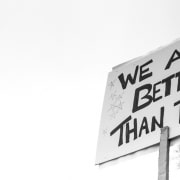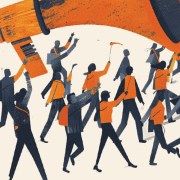|
Getting your Trinity Audio player ready...
|
By Themba Maseko
First published on News24
At the end of May, the nation is expected to conduct an introspection about the numerous crises facing the country. These crises include rising levels of poverty, inequality, unemployment, crime, an energy crisis, and a loss of confidence in the state’s capacity to fulfil its electoral and constitutional mandate.
Many, if not all, of these crises are attributable to a governance crisis that is caused by poor planning, poor leadership, and lack of accountability. The country is also experiencing increased social unrest and protests, which points to citizen discontent and impatience.
Further, the scourge of corruption continues to be an albatross and an impediment to addressing these crises that are engulfing the country and posing a risk to our democracy. However, this is no cause for despair as the country’s democratic institutions remain strong, and our citizens remain resilient. The civil society sector remains agile, strong, and well-positioned to lead the struggle to expose corruption to defend our democracy and demand accountability.
Corruption Watch remains at the centre of the fight against corruption, determined to hold those in power accountable because we understand that this hard-won democracy must be defended by all South Africans who care about the future of their country.
The increasing level of collaboration in the civil society sector, including collaboration to put pressure on the state to implement the recommendations of the Zondo Commission, is welcomed. This contributed, in part, to the state publishing proposed amendments to the Protected Disclosures Act.
South African citizens have an important job to do
Corruption thrives when citizens enable the governing elite to use their positions of authority to manufacture a reality that society should live by.
A passive citizenry that does not demand accountability and fails to expose corruption only encourages brazenness. It is encouraging to see that the citizenry is showing signs of intolerance of corruption, mediocrity, and lack of accountability. Fighting corruption, demanding better delivery of services, and demanding accountability are the new struggles that require all South Africans to dedicate new energy and dedication to demand change.
In this election year, South Africans of all ages, races, and classes have an important job to do: to help change the landscape in a country that desperately needs relief from corruption, and the smooth delivery of basic services. We must put pressure on our elected leaders and public servants to institute lasting changes and intensify the fight against corruption.
Although government’s proposals to introduce new measures to promote whistle-blowing and to support whistle-blowers is commended, more needs to be done to reintroduce the Batho Pele principles which require elected leaders and all public servants to put citizens’ interest above their own. Citizens expect nothing less than to be led by ethical leaders.
Democracy is more than exercising the right to vote
Many refer to the 2024 general elections as a poll against corruption in all its manifestations. While voting is an important tool for change, it is not the only one, nor is it enough. Voter education is urgently needed to educate and mobilise the electorate to understand that demanding better services and holding accountability must continue beyond election day.
Democracy means more than exercising the right to vote. Citizens cannot afford to outsource their future to a handful of elected individuals and not hold them accountable for addressing the crises that are engulfing our country.
With that in mind, one cannot ignore the fact that the role of civil society has never been more important since the advent of democracy. There is a need for urgent activism of a different kind that restores power to a citizenry that has become the victim of corruption and state capture. This ranges from the middle class which is concerned with issues such as load shedding, crime, and other intrusions, to those living in abject poverty who are gripped by the daily need to survive put food on the table, and gain access to quality healthcare, water, and shelter.
Slow forward momentum helps nobody
The government’s tardy response and pace in addressing citizen concerns is fuelling the perception that no one cares. For example, the process of implementing the recommendations of the Zondo Commission is moving at a snail’s pace. More importantly, many of the individuals who are implicated in the Zondo Commission report still occupy critical positions in government, state entities, and some private sector companies.
Regrettably, the whistle-blowers who played a crucial role in exposing state capture remain in dire straits, unprotected and struggling to live normal lives.
However, the few steps taken by the government to implement some of the recommendations are welcome. Examples include the proposed changes to the Protected Disclosures Act, which will go some way to provide protection and support to whistle-blowers and their families, and that additional resources have been allocated to the National Prosecutions Authority to expedite the prosecution of all the culprits who enabled, participated, and benefited from state capture.
Civil society must play a key role in mobilising the citizenry to realise its power and capability to hold the government accountable. This includes creating spaces and opportunities for all our communities to have robust conversations about corruption and finding ways of holding elected leaders accountable. This is even more possible now because of the emerging convergence of discontent across social classes, ages, races, and communities.
Needless to say, it is only under these circumstances, when our leaders feel pressure from us as citizens, that accountability for those implicated in state capture will be realised, and those who have risked it all by exposing state capture will be acknowledged as heroes and compensated commensurately.
Themba Maseko is the Corruption Watch board chairperson. This article is taken from Corruption Watch’s 2023 annual report.








